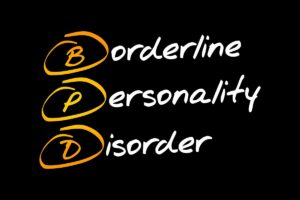Attention Deficit Hyperactivity Disorder (ADHD) and bipolar disorder are both mental illnesses that share many common characteristics. In this article, we’ll explore how BPD and ADHD are connected, and discuss the possible treatments for both disorders.
Contents
What is BPD?

BPD stands forBorderline Personality Disorder. People with BPD experience intense and repeated emotions, including anger, hatred, and fear. They also have a difficult time regulating their own emotions, leading to unstable relationships and frequent swings in mood.
ADHD stands for attention-Deficit Hyperactivity Disorder. ADHD is a common disorder that affects about 7 percent of children and adults. People with ADHD have trouble paying attention, controlling their impulses, and focusing on tasks. They may also have difficulty sustaining attention in tasks over time.
The connection between BPD and ADHD is complex, but researchers believe that the two disorders share some common features. Both disorders are characterized by emotional instability, impulsiveness, and problems with focus and attention. In addition, people with BPD often have problems regulating their emotions, which can lead to disturbances in their daily lives.
People with BPD are often unable to control their emotions or behaviors. This can make it difficult for them to have relationships and work life. Additionally, people with BPD may find it hard to stay focused on tasks for a long period. These difficulties can lead to problems at school or work as well as difficulties in personal relationships.
What is ADHD?
ADHD is a cognitive disorder characterized by inattention, hyperactivity, and impulsiveness. It is the most common neurodevelopmental disorder in children and affects about 5% of school-aged children. The disorder often persists into adulthood. According to the latest National Comorbidity Survey, adults with ADHD are almost four times as likely as those without ADHD to experience a substance use disorder.
ADHD is caused by a combination of genetic and environmental factors. It is most commonly diagnosed in children who have several of the following symptoms: difficulty staying focused, paying attention, and regulating their behavior; problems with impulsiveness and hyperactivity; poor school performance; and problems with relationships.
ADHD is also associated with several other conditions, including anxiety, depression, and substance abuse.
The Connection Between BPD and ADHD

There is a growing body of research that suggests that individuals with Borderline Personality Disorder (BPD) and Attention Deficit Hyperactivity Disorder (ADHD) share several common characteristics. Many experts believe that BPD and ADHD are closely related conditions.
According to the National Institutes of Health, people with BPD tend to have a history of unstable relationships and difficulty regulating emotions. They often have problems with self-esteem and identity, which can lead to problems with focus and attention. People with ADHD also commonly experience problems with focus, impulsivity, and hyperactivity.
A connection also exists between BPD and other mental health conditions, such as anxiety and depression. People with BPD are more likely than others to experience co-occurring mental health disorders.
It is still not clear exactly what causes BPD or ADHD, but the overlap between the two conditions suggests that there may be a common underlying cause. Future research is needed to determine exactly how these conditions are linked and to identify specific treatments that work best for each individual. Sometimes there may be an overlap between the treatments that are recommended for BPD and ADHD.
Signs That You Might be Struggling with BPD and ADHD
If you’re struggling with both Borderline Personality Disorder (BPD) and Attention Deficit Hyperactivity Disorder (ADHD), it may be hard to tell which symptoms are due to which disorder. But there are some signs that you might be dealing with both conditions. Here are five of them:
1. You have a hard time regulating your emotions.
People with BPD often experience intense and frequent emotional outbursts, as well as difficulty regulating their own emotions. This can make it difficult for you to control your reactions and stay calm in stressful situations. It can also make it hard for you to focus on tasks that require attention and concentration, like school or work.
2. You have trouble setting reasonable goals and achieving them.
People with BPD often have a difficult time sticking to plans and goals, whether they’re personal or professional. This can lead to a lot of frustration and stress, as well as a lack of motivation. It can also make it hard for you to take the steps necessary to achieve success – even if you have the talent and ability to do so.
3. You have a hard time with boundary setting.
People with BPD may be very impulsive and tend to act without thinking things through first. This can lead them to put themselves in dangerous or uncomfortable situations, as well as violate the trust of those around them. It can also make it difficult for them to set boundaries with others – whether that means refusing requests for favors or staying away from people who upset them.
4. You struggle with maintaining healthy relationships.
People with BPD often have a hard time forming stable, meaningful relationships – both romantic and platonic – due to their impulsiveness and problems with self-regulation. This can make it difficult for them to build supportive networks of friends and family, which can be crucial for coping with day-to-day life struggles.
If you’re struggling with both BPD and ADHD, it may be a sign that you need to seek out professional help. A therapist can help you understand the root causes of your symptoms and develop strategies for managing them. In addition, they may be able to provide support and guidance as you work to improve your relationships, achieve goals, and establish healthy boundaries.
How To Treat BPD and ADHD?

Treating the connection between BPD and ADHD can be difficult, but many treatments can help. Some of the most common treatments include therapy, medication, and self-help strategies.
Medications
One of the most common treatments for the connection between BPD and ADHD is medication. Medications can help to improve both conditions, and some medications are specifically designed to treat both conditions. Some of these medications are also available as generic versions, so there is a likely option available to most people.
Therapy
Another common treatment for the connection between BPD and ADHD is therapy. Therapy can help to improve both conditions, and it can also provide some relief from the associated symptoms. This type of treatment can be expensive, but it may be worth it if it helps to improve the quality of life for those affected by both conditions. Types of therapy are available in both individual and group settings, so there is likely a treatment that is right for you.
Self-help Strategies
If self-help strategies are not suitable or available for you, other treatments can help to improve the connection between BPD and ADHD. These treatments may include medication or therapy, or they may involve other therapies like mindfulness or cognitive behavior therapy. There is likely a treatment that is right for you, so it is important to explore all options.
Some self-help strategies that can help treat the connection between BPD and ADHD include:
●ocusing on positive behaviors – People with BPD often have a difficult time sticking to positive behavior guidelines, so it may be helpful to focus on positive things instead. This can help to build up positive self-esteem, which can be beneficial in reducing symptoms of BPD.
●establishing boundaries – People with BPD often have a difficult time setting boundaries with others. So it may be helpful to establish specific limits with those who are causing problems. This will help protect both parties involved while still allowing for some degree of communication.
●seeking out social support – People with BPD may find it difficult to maintain healthy relationships, so it may be helpful to seek out social support. This can help to provide a sense of stability and support, which can be beneficial in managing symptoms of BPD.
●practicing self-compassion – People with BPD often have a difficult time regulating their emotions, so it may be helpful to practice self-compassion. This can help to reduce Negative Self-talk and improve overall mood.
Treating the connection between BPD and ADHD can be difficult, but many treatments can help. Some of the most common treatments include therapy, medication, and self-help strategies.
Conclusion
There is a growing connection between borderline personality disorder (BPD) and Attention Deficit Hyperactivity Disorder (ADHD). According to the National Institute of Mental Health, people with BPD are five times as likely as the general population to also have ADHD. People with BPD also have a higher rate of suicide attempts, thoughts of suicide, and self-harm than people without BPD. Additionally, people with BPD are more likely to experience chronic relationship problems and have lower self-esteem than people without BPD.
Hope this article was of help to you! If you are suffering from mental health disorders, you may seek help from Therapy Mantra. We have a team of highly trained and experienced therapists who can provide you with the tools and skills necessary for overcoming mental health disorders. Contact us today to schedule an online therapy or download our free Android or iOS app for more information.


